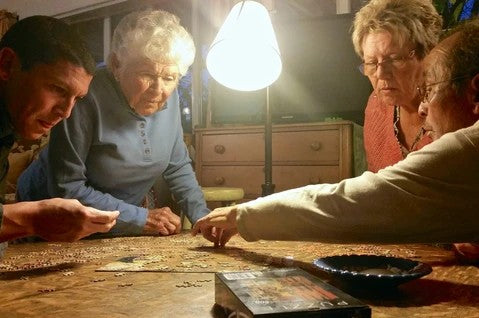We Turn Your Most Cherished Photo Memories Into Personalized Puzzle fun...

Many years ago I purchased a personalized puzzle from a company that had an impressive website and all the right images. The price was ridiculously high and the time that it took to receive the product was weeks from the time of order. When I finally received the puzzle I was so disappointed that I became skeptical of ordering online. The puzzle that I had paid a hefty fee for was extremely smaller than expected, as they never advertised a finished size on the product but had an impressive piece count that misled me. Not only that, it was thin as a matchbook! My disappointment stayed with me for a very long time...
I am a retired Special Needs teacher who used puzzles in the classroom. I am also a widowed Mom to the most incredible amazing son, Artie, who has autism and is my inspiration and helper.
My son was having difficulties with focusing and I thought that a photo puzzle of himself would help. Immediately, I flashed back to my experience and decided against it. The idea began to bug me so I opened my own company to correct all of the pitfalls of the industry. Our puzzles are made thick and with high-quality materials. After all, they were made for my son and he sets the bar pretty high! The idea was born out of love and continues to grow...
At The Missing Piece Puzzle Company, we specialize in turning your cherished memories into timeless treasures. With our passion for craftsmanship and commitment to excellence, we take pride in offering custom photo puzzles that capture the essence of your most precious moments.

My company has been reviewed by YouTube influencers DOPE OR NOPE, and of course, The Missing Piece Puzzle Company is DOPE! How fun is that?
It's also rumored that one of our puzzles made a trip to the ISS, unfortunately, I cannot officially confirm or deny... (That was epic!)
You can read about The Missing Piece Puzzle Company in several newspaper articles, such as the Huff Post, AC Press and other local wedding blogs. I'm truly honored by their kind words.
My puzzles were featured TWICE on the TODAY SHOW, once for "Best Personalized Christmas Gifts", and another time for "Best Personalized Mother's Day Gifts." The Missing Piece Puzzle Company continues to be recognized as a leader in the custom puzzle industry.
Did you know that we also have won several awards for the high-quality of our custom puzzles, notably being named The American Small Business Champion from Sam's Club and SCORE!
Check out our reviews from verified customers to see what they are saying.
I'm honored to be a woman owned and operated small business.
We love what we do, and we do it well!




Comments
Bridget
My parents who are in their 70s enjoy puzzles. They started doing them during the pandemic and are now addicted.
June 08, 2021
Leave a comment